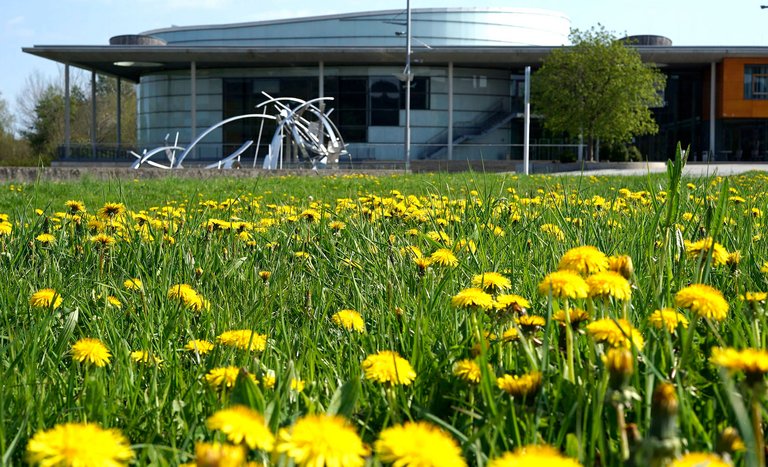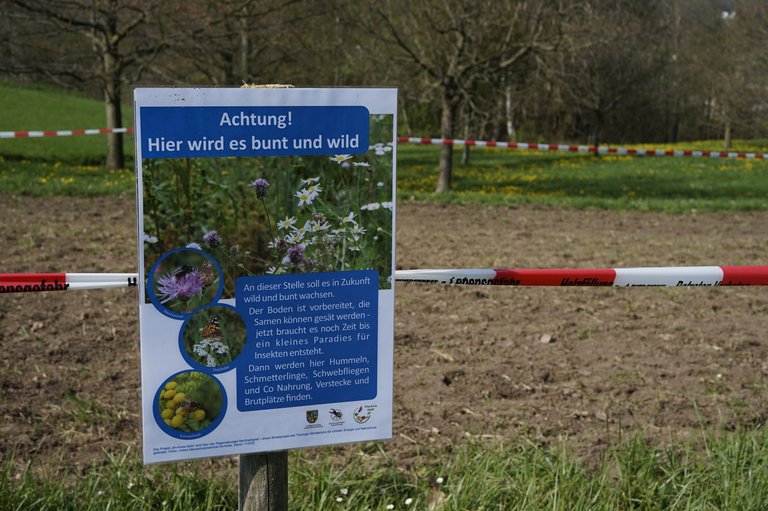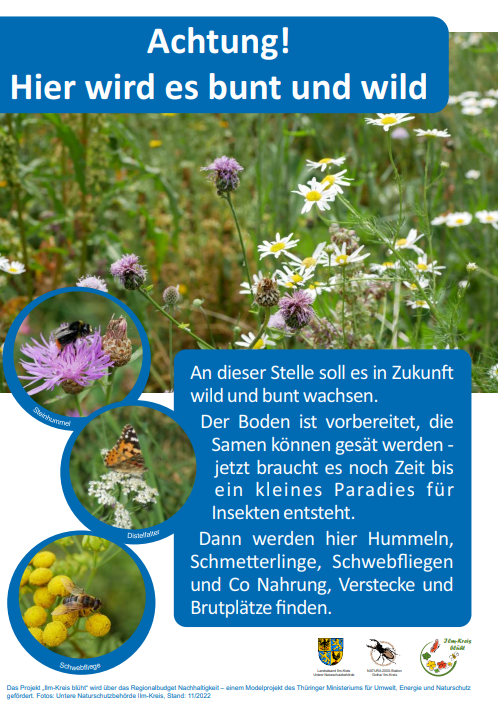On the way to a Sustainable Community, TU Ilmenau has created new flowering meadows in recent weeks: In addition to the existing "Wild Meadow" behind the University Computing Center, there are now three new "Insect Meadows" on campus with a total area of 500 square meters. They are intended to serve as a food source and habitat for bees, butterflies and other insects. The flowering areas were made possible by the Division of Facilities and Operation as part of the "Ilm-Kreis blüht" campaign.

Dennis Pohlig, head of the Division of Facilities and Operation at TU Ilmenau, is convinced: "It is also possible on campus not to mow everything flat, but to create new living spaces. He and his colleagues had already been mowing unused areas on campus less frequently since 2022 in order to let the meadows grow instead - away from the beauty ideal of the English lawn: "Where can you still throw yourself into the tall grass today?" Such thoughts played a role in Dennis Pohlig's reflections, as did private experience: "When I was driving, I noticed that - unlike in the past - hardly any insects still stick to the windshield."
Researchers at the iDiv, the "Deutsche Zentrum für integrative Biodiversitätsforschung Halle-Jena-Leipzig", recently demonstrated the reasons for this in a large meta-study. For the study, they had compiled results from 166 long-term studies conducted between 1925 and 2018 at nearly 1,700 locations worldwide. The result: A quarter fewer insects within 30 years - in Germany even more: While worldwide especially land-dwelling insects such as butterflies, grasshoppers or ants have declined by about one percent per year, in Germany it is an average of two percent.
Nevertheless, the response to the developing meadows at the University of 2022 was definitely mixed: "Some just thought the areas were derelict. But many also thought it was really good." As part of the "Ilm-Kreis blüht" campaign, the university has now gone a step further and, together with the Lower Nature Conservation Authority (Untere Naturschutzbehörde), has identified marginal strips on campus near the "Ilmenauer Teiche" nature reserve that are being specifically developed as "flowering meadows" and thus as additional habitats for insects and birds.
We also selected the edge strips on the way to the Humboldt Building, in front of the Oeconomicum and the project hall because the flowering meadows must of course ensure traffic safety
says Dennis Pohlig.
The necessary technology for the concern of the meadows, a seed mixture particularly co-ordinated with the region as well as signs for the marking of the surfaces with wood stakes, which can be used at the same time as insect hotels, makes likewise the nature protection authority available. So the action doesn't cost the university a penny extra.
For us, the whole thing is a pilot project, and we are curious to see how the meadows develop. If it goes well, I can imagine that we will selectively expand other flower strips in the periphery, for example behind the International Meeting Center (IBZ), where the old district heating line used to run - there would definitely be enough currently unused space there.
About the "Ilm-Kreis blooms" campaign
The "Ilm-Kreis blüht" campaign is an initiative of the district in cooperation with the Natura 2000-Station Gotha/Ilm-Kreis. The project is financed by the "Regionalbudget Nachhaltigkeit" - a model project of the Thuringian Ministry for the Environment, Energy and Nature Conservation.
Within the scope of the large-scale project, as many flowering meadows, flowering hedges, species-rich roadsides and protected fields as possible are to be created, developed and maintained.
explains Petra Enders and refers to old-known, but outlived thought patterns such as "dead wood must be cleaned up", "lawn must be kept short", "nettles and thistles must be plucked out".
The goal of 'Ilm-Kreis blüht' is to promote insect diversity through conservation, ecological enhancement and habitat creation. This is because insects find nesting sites, food and building material in their habitats. This is a project that can only succeed in cooperation with local authorities, communities and interested citizens
says the district administrator.
University members can also contribute to the success of the campaign with measures in their own gardens:
Measures that are easy to implement, such as mowing the lawn less frequently, letting thistles and nettles grow in a corner of the garden and perennial stems stand over the winter, or not clearing piles of leaves, not only have a positive effect on insects, but also save a lot of unnecessary work
says Petra Enders.
Contact
Dennis Pohlig
Head of the Division of Facilities and Operation



